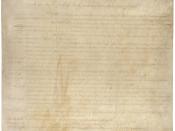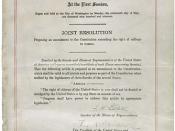The issue over the separation of church and state is ever present in today's society. Much of the controversy stems from the First Amendment which guarantees our most basic rights--freedom of religion, press, speech, and assembly. Some argue that anything, whether it be an object or phrase, should be removed from the pubic scene if it portrays religion. The government is not forcing specific religion upon us by school prayers or the Pledge of Allegiance. The First Amendment, interpreted differently by many people, was set up to give us, the people, the basic human rights we deserve.
On November 18, 2002, the Alabama Supreme Court ruled that a monument etched with the Ten Commandments sitting outside the state judicial building must be removed on grounds that it violated the United States Constitution. June of 2002 a California court ruled that the Pledge of Allegiance violated the first amendment by using the words "under God."
Many of today's laws are based upon values and morals the Ten Commandments portray: "Thou shalt not kill, Thou shalt not commit adultery, Thou shalt not steal." This nation was founded on a religious background and has prospered since.
The First Amendment states that Congress shall make no law respecting an establishment of religion, or prohibiting the free exercise thereof: "not allowing the expression of a belief in God is every bit as unconstitutional as forcing or endorsing one" (Whitrock 641). Two clauses in the First Amendment guarantee this. The establishment clause prohibits the government from passing legislation to create a national religion or endorsing one over another and the free exercise clause prohibits the government from interfering with the individual's practice of religion. Many people quote Jefferson's line, "wall of separation between church and state". Jefferson did not mean to abolish religion from...


